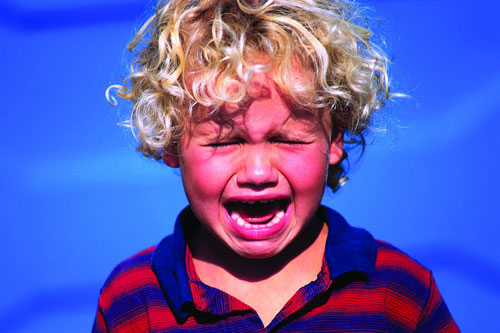.jpg)
Every early childhood graduation has one. One crier. One anxious, uncertain child. One kid who finds it utterly impossible to get up on stage. This is my child.
This year it was his Kindergarten graduation. In the past two years’ of nursery celebrations, my son, “J” had been overwhelmed by emotion simply by walking down the aisle that led to the stage. As he approached the chair with his name on it, he’d scan the audience for me, and I’d rush up to the front, wrap my arms around him, and comfort him. We’d watch the ceremony together on the floor in front of the stage, singing and performing the practiced hand-motions together. “Don’t bother taking off from work,” I told my husband that second year. I knew J wouldn’t make it. There are no pictures from that performance. Only of us at the collation, smiling, with a chocolate chip cookie in hand.
I forewarned his teachers before the Kindergarten graduation. “J has a hard time being on stage. He doesn’t like people looking at him.” This held true when three of my siblings were wed the previous year, and we practically had to drag him down the aisle with us, hiding his face in my husband’s tuxedoed leg. Smile! I heard someone in the audience command, while we marched down, an awkward trio. This made him cry harder.
The teachers didn’t think he would have any issues with the performance. He seemed fine during practices, and was happy to be a part of the group. I broached the subject with him a few nights before the big day. “Are you going to make it on stage for the graduation?” I asked. He nodded. And we struck a deal: He wanted me to read him a book (instead of him having to read it to me), and in return, he’d have to stay on stage. If he didn’t, he would have to give me his Bey-Blade stadium to keep.
As the days wound down, I reminded him of our deal. “You don’t have to sing or speak, just stand there,” I coaxed, telling him that more people will notice him if he is crying, and less will stare if he is singing along with everyone else. He nodded enthusiastically, and I was almost convinced that he believed in himself.
My husband took off from work on the morning of the graduation, and although we were rather late getting there, we made it in time to see J’s class marching in. From the back row, my husband and I, and J’s three siblings, all waved, and his face didn’t crack as it had in the past. His gaze was neutral, not icy or detached, and happiness seemed to leap from his face. But as the children assembled on the stage, and J saw the sea of faces watching him, watching the entire class, he lost his composure.
I saw the delicate shift, watched as his hands flew to his eyes and he tried to desperately hide himself from the onlookers, as if covering his face would conceal his shame. If he couldn’t see them, they can’t see him. He sobbed and his shoulders shook, and my husband and I stayed in our seats in the back row. “Let’s not look at him,” he whispered to me, and I saw the sadness on his face, mirroring our son’s.
I bit back my own sorrow, swallowing hard and taking pictures of my daughters making silly faces next to me, so that I wouldn’t have to watch my son. And it’s not that I was disappointed in him that he couldn’t sing the Hebrew songs with the rest of the class, but that he was caught in a struggle, a deep, personal challenge, and he had to face it in public.
As parents, our instinct is to rush over the instant our child falls, with a band-aid, an ice-pack, an endless array of kisses. We swoop in at every display of pain or panic and try to ease the discomfort. Their pain is our pain. But maybe it’s okay to sit back and let them figure it out; to Ferberize a little, both in the crib, and in life.
We remained in our seats.
“Aww, that little boy is crying,” I overheard the family in front of us whisper. And I know they felt sympathetic, but also relieved that it wasn’t their child. Nobody wants to be the parent of the nose-picker, the one who sings off-key, or the crier.
But I didn’t pity us. I didn’t feel bad. Instead, I was proud.
I was proud because J was standing with the group despite his intense fear. He was standing with the group, even though he couldn’t find his voice, couldn’t sing. He was keeping his end of the deal, despite the fact that his body was defying him. I saw his bravery, his strength, his determination, and I admired him. And slowly, he started to wipe his nose on the collar of his shirt and on the backs of his hands, and his tears dried up. It was then that I became the parent of the crier, and the nose-picker.
His tears stopped and started throughout the half-hour performance, and J even managed to mouth a few words to the songs. His hand-motions were shaky, as he was constantly drying his face, but in the back row, my husband and I were beaming. We could not have been prouder of our crier for standing together with the class. For overcoming his challenge.
A week later, my younger daughter graduates from her three-year-old nursery school. She is a statue on the stage and sticks her fingers in her mouth for the entire performance. I suspect she may even be drooling. She is doing her best, I think. And I am happy.
By Sarah Abenaim










